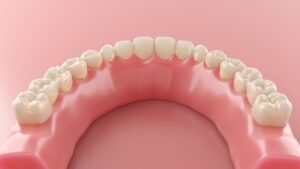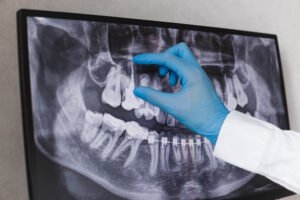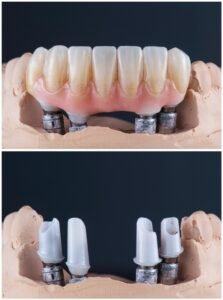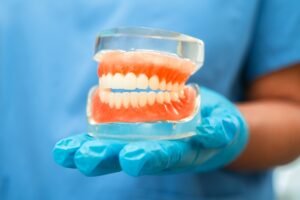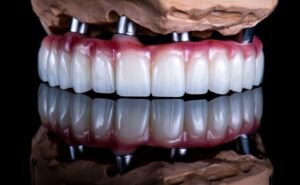Veneers are thin shells that cover front teeth for cosmetic enhancement. Dentures are removable artificial teeth for missing teeth replacement.
When considering Veneers vs Dentures, it’s essential to understand the key differences between the two dental treatments. Veneers are a popular choice for enhancing the appearance of teeth by improving their color, shape, and size. In contrast, dentures are commonly used to replace missing teeth in part or full sets.
Both options have unique benefits and considerations depending on individual dental needs and preferences. Understanding the distinctions between veneers and dentures can help individuals make informed decisions about improving their oral health and aesthetics.
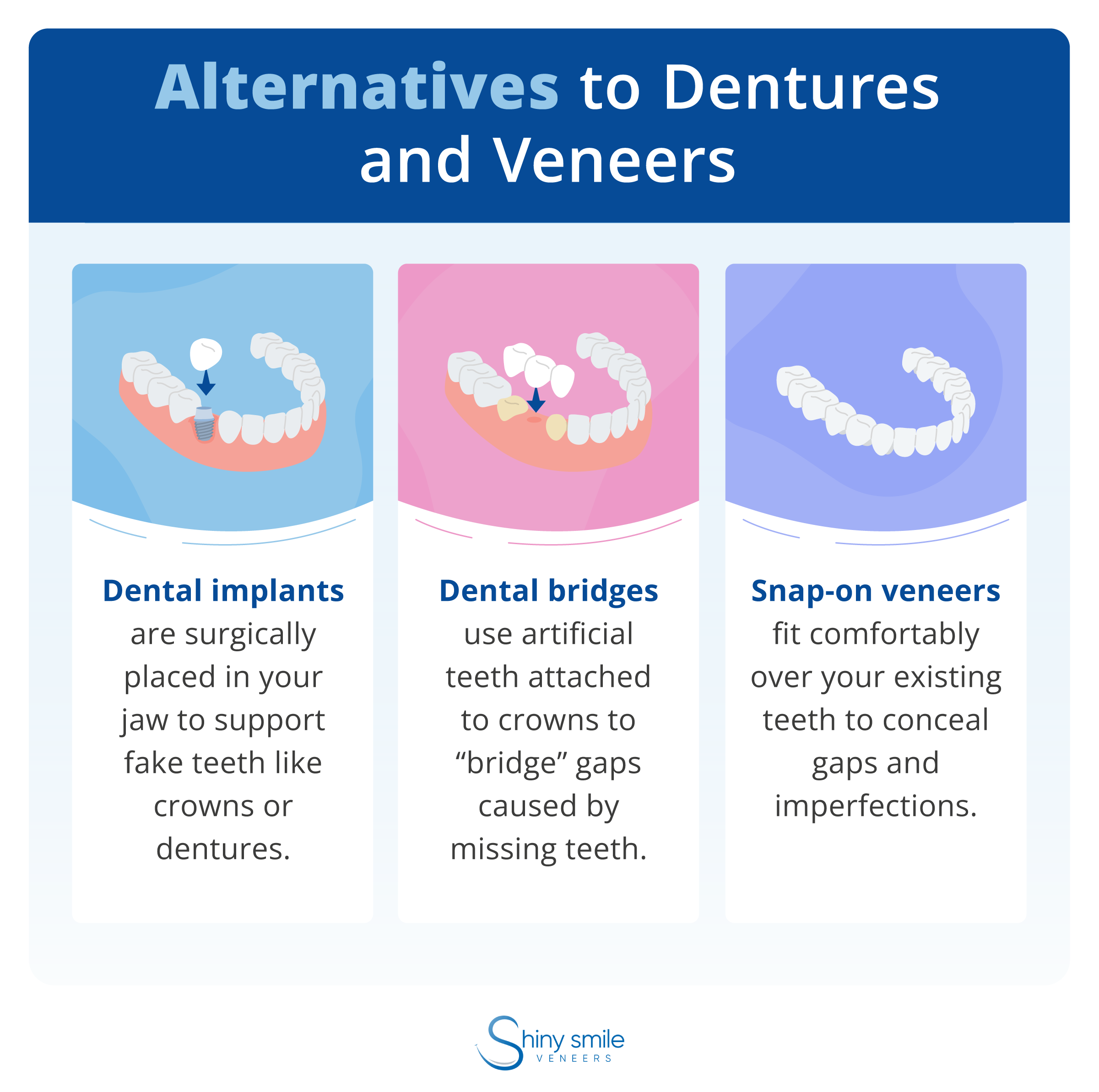
Credit: www.shinysmileveneers.com
What Are Veneers?
Veneers are thin shells made of porcelain or composite resin. They are custom-made to fit over the front surface of a tooth. This cosmetic procedure can improve the appearance of teeth that are discolored, worn down, chipped, or misaligned. Veneers can also close gaps between teeth and make them look more even. There are two main types of veneers, porcelain and composite resin. Porcelain veneers are more durable and resist stains better. On the other hand, composite resin veneers are thinner and require removal of less of the tooth surface. The main benefits of veneers include improved appearance, durability, and the ability to color-match to natural teeth.
What Are Dentures?
Dentures are removable replacements for missing teeth and surrounding tissues.
They come in two main types: full dentures and partial dentures.
Full dentures are used when all teeth are missing, while partial dentures are used when some natural teeth remain.
Dentures help improve chewing ability, speech, and facial appearance.
They are custom-made to fit comfortably and match the color of natural teeth.
Having dentures can restore confidence and help maintain overall oral health.
Differences Between Veneers And Dentures
Explore the distinction between veneers and dentures. Veneers enhance the appearance of teeth, while dentures replace missing teeth for functionality and aesthetics. Choose veneers for cosmetic improvements and dentures for comprehensive tooth replacement.
| Material Used | Veneers: Thin porcelain shells | Dentures: Acrylic or metal framework |
|---|---|---|
| Purpose and Function | Veneers: Cover discolored or damaged teeth | Dentures: Replace missing teeth |
| Coverage | Veneers: Front surface of teeth | Dentures: Full mouth or partial |
| Durability | Veneers: Last 10-15 years | Dentures: Need regular adjustments |
| Cost | Veneers: Higher initial cost | Dentures: More affordable option |
Factors To Consider When Choosing Between Veneers And Dentures
When deciding between veneers and dentures, there are several important factors to consider. The condition of your teeth plays a crucial role in determining which option is best for you. Veneers are ideal for individuals with minor cosmetic imperfections, while dentures may be more suitable for those with extensive tooth damage or missing teeth.
It’s essential to assess your budget and long-term goals when choosing between veneers and dentures. Veneers typically require a larger upfront investment, but they offer durability and a natural appearance. Dentures, on the other hand, may be a more cost-effective solution for individuals with budget constraints.
Maintenance and care are also critical considerations. Veneers demand minimal maintenance, whereas dentures require regular cleaning and occasional adjustments. Additionally, the fitting process differs for each option, with veneers involving a non-invasive procedure and dentures requiring precise measurements and fittings.
Who Is A Suitable Candidate For Veneers?
A suitable candidate for veneers is someone who has good oral health, stable teeth, and cosmetic concerns. It is important to have good oral health before getting veneers to ensure their longevity and success. This includes having healthy gums and being free from any active tooth decay or gum disease.
A person with stable teeth, meaning that they have strong and healthy tooth structure, is also a good candidate for veneers. Veneers are a cosmetic dental treatment that helps improve the appearance of teeth, but they require a solid foundation to be bonded to.
Lastly, individuals who have cosmetic concerns about the appearance of their teeth can benefit from veneers. Whether it’s discoloration, chipped or misaligned teeth, veneers can help create a beautiful smile. Consulting with a dentist is essential to determine if veneers are the right solution for specific cosmetic concerns.

Credit: www.nuviasmiles.com
Who Is A Suitable Candidate For Dentures?
Veneers and dentures are both popular options for restoring missing teeth. However, dentures are generally recommended for individuals with multiple missing teeth. Dentures are suitable for those who have poor oral health due to extensive tooth decay or gum disease. They can also be a good option for individuals experiencing functional impairment, such as difficulty chewing or speaking properly. Dentures provide a removable and cost-effective solution for replacing multiple missing teeth. They are custom-made to fit securely in the mouth and restore oral function. On the other hand, veneers are used to address cosmetic concerns and are typically recommended for individuals with minor tooth imperfections or single missing teeth. Veneers are thin shells that are bonded to the front surface of the teeth to improve their appearance. Ultimately, the choice between veneers and dentures depends on the specific needs and circumstances of each individual.
Potential Risks And Side Effects
Veneers: Veneers may lead to temporary sensitivity to hot and cold foods. There could be a risk of chipping or cracking if not properly cared for. It’s important to avoid biting down on hard objects to prevent damage.
Dentures: Dentures may cause soreness and discomfort initially. There’s a possibility of slippage while eating or talking, which can lead to embarrassment. Regular visits to the dentist are necessary to ensure proper fit and function.
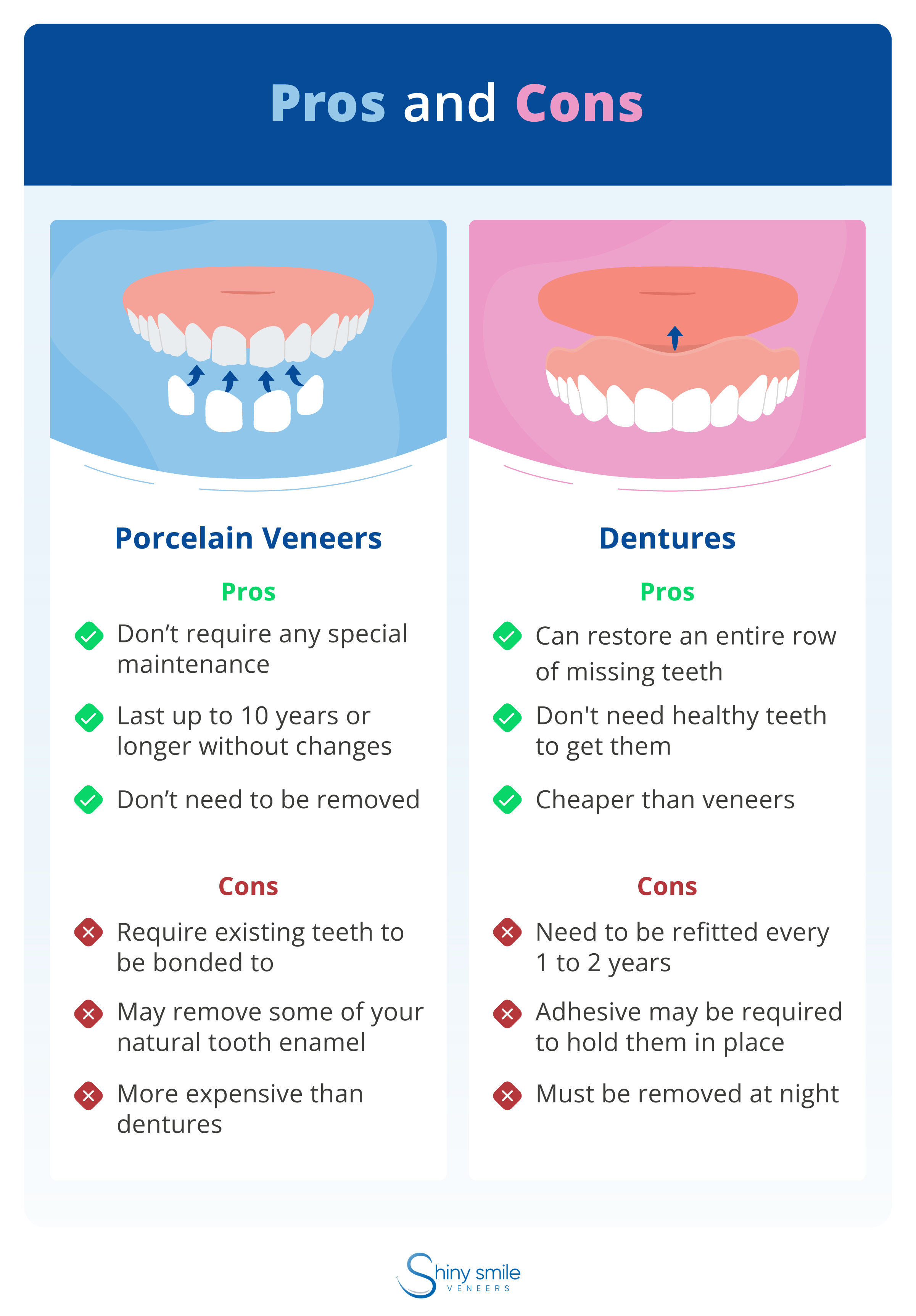
Credit: www.shinysmileveneers.com
Frequently Asked Questions For Veneers Vs Dentures
Are Veneers Or Dentures Better For Improving Smile Appearance?
Veneers are thin, custom-made shells that cover the front side of teeth to enhance their appearance. They are perfect for correcting teeth stains, chips, and slight misalignments. On the other hand, dentures are removable appliances that replace missing teeth. They are ideal for individuals who have multiple or all teeth missing.
Can Veneers Fix Crooked Teeth?
While veneers can improve the appearance of teeth, they are not designed to correct severe misalignments or crookedness. Veneers are more suitable for addressing minor gaps or misaligned teeth. In cases of significant misalignment, orthodontic treatments such as braces or Invisalign are generally recommended.
How Long Do Veneers And Dentures Last?
Veneers can last up to 10 to 15 years with proper care. However, they may require replacement or repair over time due to wear and tear. Dentures have a lifespan of around 5 to 10 years, depending on how well they are maintained.
Regular check-ups and good oral hygiene practices can extend the longevity of both veneers and dentures.
Can Veneers Or Dentures Affect Speech?
Veneers should not significantly impact speech since they are designed to be ultra-thin and custom-fit to each individual. Dentures, especially in the initial adjustment phase, might slightly affect speech due to the presence of an object in the mouth. However, with time and practice, most individuals adapt and speak naturally again.
Conclusion
In essence, both veneers and dentures offer solutions for improving your smile and dental health. Understanding the key differences and benefits of each option is crucial for making an informed decision. By consulting with your dentist and considering your specific needs, you can determine which option is best suited for you.
Whether seeking a cosmetic enhancement or a functional dental fix, both veneers and dentures offer viable options for achieving your desired results.

